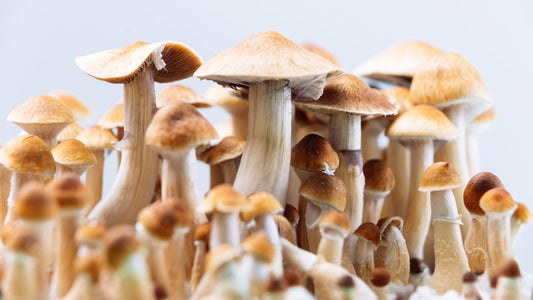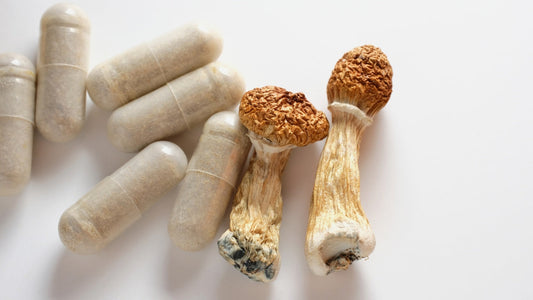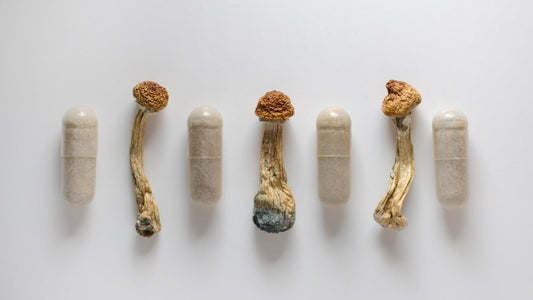Have you ever felt like you were juggling ten thoughts at once – but when you try to focus on one, they all disappear? ADHD can feel like ten thoughts at once—and none stick. If you have experienced this or other symptoms of adult Attention Deficit Hyperactivity Disorder (ADHD), then you know how it can limit quality of life. Brain-boosting nootropic supplements, which are a type of dietary supplements, may help to manage ADHD symptoms.
Stimulants (pharmaceutical nootropic drugs) are often prescribed by doctors to treat ADHD. Stimulant medications are well-researched and effective, but they aren’t right for everybody. Nootropics for ADHD represent a natural alternative therapy that may help to improve attention and more.
In this article, we will share the best ADHD nootropics along with some high-quality supplements (also called "nootropic stacks") that combine these brain boosters most effectively. Let's get to it!
Key Takeaways
- Nootropics are ingredients in dietary supplements that enhance cognitive functions. Some nootropics have shown promise in clinical trials to help with focus, attention, mood and memory. These benefits may help people with ADHD.
- ADHD nootropics may work by influencing neurotransmitter levels, nourishing brain structure, increasing blood flow to the brain and other beneficial bioactivities.
- Before starting any nootropic regimen, you should consult with your doctor to create a safe and effective plan for your unique health needs.
- Nootropics can be one part of a doctor-supervised ADHD management plan that might include integrative treatments for diet, exercise and sleep plus behavioral therapies.
- While some nootropics have shown promise in clinical studies, more research is needed to fully understand their efficacy and safety for ADHD.
Nootropics & Nutrients to Consider for ADHD Support
- Omega-3 Fatty Acids: Top research-backed ADHD nootropic. Supports mood and brain health.
- Phosphatidylserine (PS): Helps to improve memory and cognitive function.
- Citicoline: Supports brain energy and neurotransmitters for memory and attention.
- L-Theanine: May help to improve focus and promote feelings of relaxed alertness.
- L-Tyrosine: Supports attention-related neurotransmitters like dopamine and norepinephrine.
- Maritime Pine Bark Extract: Supports blood flow to the brain for cognitive performance.
- Rhodiola rosea + Bacopa monnieri: Adaptogen herbs studied for stress resistance.
- Melatonin: Helps improve sleep quality, which can indirectly benefit ADHD symptoms.
- Caffeine: Natural stimulant for alertness and focus via dopamine and norepinephrine support.
- Essential vitamins & minerals: Zinc, iron, magnesium, B-vitamins (especially B6), Vitamin D and other essential nutrients for brain health have been linked to attentional performance.
- Prebiotics & Probiotics: Promote gut-brain health, potentially enhancing cognition and mood.
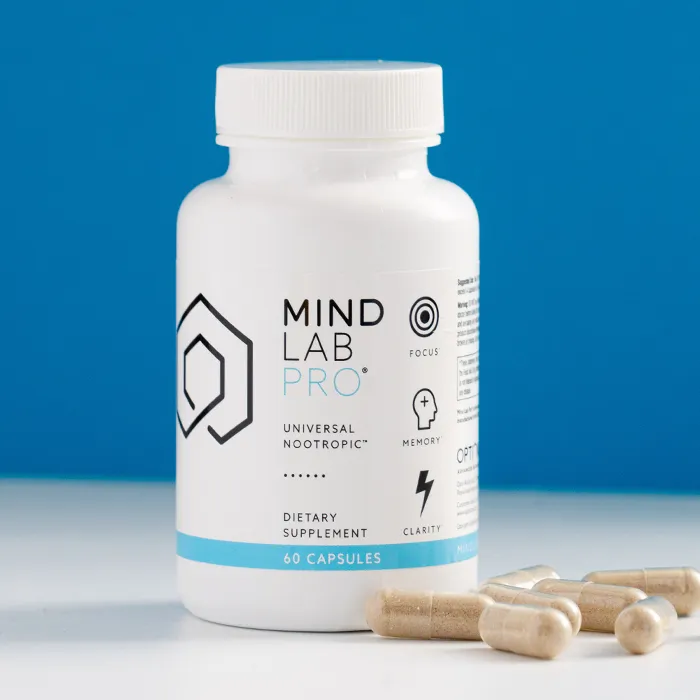
Best All-In-One Nootropic ADHD Stack
- Mind Lab Pro® - 11 nootropics in 1 formula that does it all, including enhancing attention. It is backed by two clinical trials demonstrating its benefits for memory and processing.(1,2)
Top Omega-3 Supplement for ADHD
- Performance Lab® Omega-3 - Plant-based omega-3s sourced from marine algae. Clean, vegan-friendly softgels. Easy to take every day, with no fish burps, fish toxins or related eco concerns.
Additional Top Dietary Supplements for Attention
- NutriGenesis Multi - High-absorption cultured vitamins and minerals required for brain function
- Caffeine 2 - Precision-dose caffeine pill for peak focus benefits without overstimulation & jitters
- Performance Lab Sleep - Cherry-sourced melatonin for deep regenerative sleep that aids focus
- Prebiotic - Microbiome support; nourishes probiotics in gut for mood and brain chemical balance
*We discuss each of these best nootropics for ADHD in greater detail towards the end of this article.
Disclaimer: ADHD (Attention-Deficit/Hyperactivity Disorder) is a medical condition that requires professional evaluation and treatment. It is essential to consult with a healthcare provider for an accurate diagnosis and appropriate plan for treating ADHD symptoms. The supplements discussed in this article are not intended to diagnose, treat, or cure ADHD and should only be taken under the guidance and supervision of a doctor. Always seek professional medical advice before starting any new supplement regimen, especially for managing ADHD.
What is ADHD?

Attention-deficit/hyperactivity disorder (ADHD) is a genetic mental health issue marked by an ongoing pattern of inattention and/or hyperactivity-impulsivity. Adults with ADHD symptoms may experience changes in brain performance associated with a range of cognitive and behavioral issues including:(3)
- Disorganization
- Multitasking difficulty
- Mental fatigue
- Inability to concentrate
- Poor planning
- Mood swings
- Diminished cognitive ability
- Trouble coping with stress
ADHD is relatively common. It also lasts a lifetime. If you have it, then you are likely familiar with ADHD's far-ranging negative impact across brain function, academics, professional productivity, personal relationships and social relations.
As frustrating as ADHD symptoms can be, there are options to help, including ADHD drugs and strategic supplementation with natural brain-boosting nootropics.
To understand how natural nootropics for ADHD might work, let's first delve into what is believed to cause attention problems in the first place.
ADHD's Brain Chemical Connection
While researchers do not yet know exactly what is behind ADHD, one popular hypothesis involves brain chemistry. Specifically, researchers are interested in three thought-regulating neurotransmitters (brain chemicals) collectively known as catecholamines:
- Norepinephrine: Manages attention, vigilance and sleep cycles
- Dopamine: Drives motivation and reward/gratification functions
- Epinephrine: Stimulates brain for sharp, quick thinking under stress
Unbalanced catecholamine levels are associated with ADHD.
This might be because healthy catecholamine levels are critical for our brains' ADHD-linked executive functions, including attention, working memory and impulse control.
Considering catecholamine neurotransmitters' specific impact on the brain's executive functions, it's easy to see how a disruption of the catecholamine system might affect focus, decision-making, mood, social interaction, and other ADHD (as well as ADD) markers.
"Attention-deficit/hyperactivity disorder (ADHD) is believed to be a result of abnormalities... Underpinning these abnormalities are disturbances of catecholamine neurotransmission."(4)
How Might Nootropics for ADHD Help?
Conventional ADHD therapies typically target the catecholamines Norepinephrine and dopamine: the very same brain chemicals that are associated with attention and suggested to enhance cognitive performance.
In theory, nootropics that support those same neurotransmitters might help with attentional performance, as well as enhance cognition and other executive functions that may be affected by ADHD.
Catecholamine-optimizing nootropics may help to sharpen attention safely, naturally and without the use of stimulants.
L-Tyrosine may be among the best nootropics for ADHD because it is the primary building block for synthesizing catecholamine neurotransmitters. But we'll get to that in a minute.
In addition to supporting attention-related brain chemicals, nootropics may indirectly help with other ADHD-related mental performance issues like:
- Memory
- Motivation
- Relaxation
- Energy
- Concentration
- Focus
The doctors wanted me on Adderall or Ritalin which are both addictive. I wanted to try something natural first and see what happens and I can honestly say that these supplements are amazing!Marisol R.
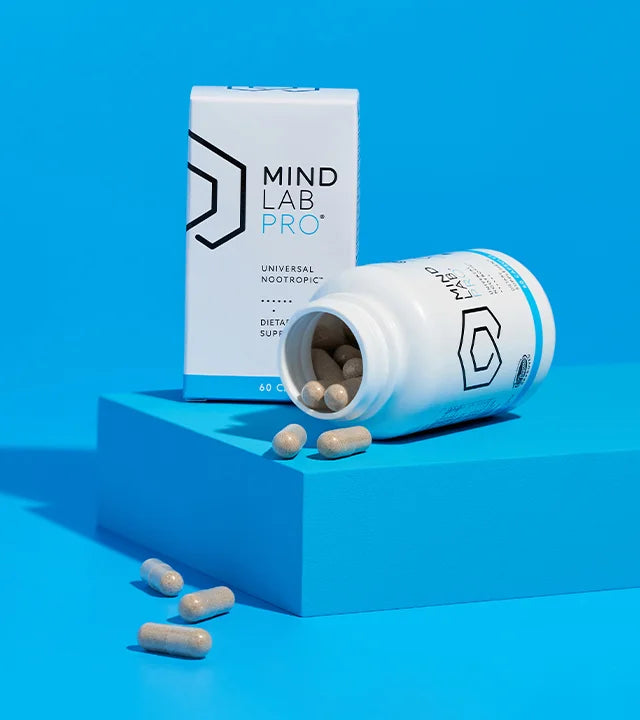
Let's check out some of the best nootropics for ADHD that can help with these brain benefits.
Best Nootropics for ADHD Symptoms

Nootropics currently used to help in managing ADHD symptoms include vitamins, minerals and herbs plus omega-3 fatty acids.
The scientific community is cautiously optimistic, with some studies supporting the potential of these supplements in improving ADHD symptoms. However, more rigorous research is needed.
Among consumers, nootropics are increasingly popular as natural support or as complementary options to traditional ADHD therapies. While some individuals report noticeable improvements, responses can vary widely.
The following list of promising nootropics for ADHD symptoms includes some that have been studied for attention deficit hyperactivity disorder (ADHD) specifically.
Plus complementary brain boosters, sleep enhancers and microbiome-boosters that provide valuable extra support for anyone with ADHD.
Omega-3 Fatty Acids

Omega-3 fatty acids, particularly DHA, are important for the brain. They are considered nootropics for their ability to fight cognitive decline, improve memory, support mood balance, nourish overall brain health and enhance cognitive processing -- as well as their potential to reduce ADHD symptoms.
Research has revealed that ADHD patients have lower blood levels of Omega-3 fatty acids, which has spurred interest in these brain-healthy fats as a possible therapy for attention problems.
In one scientific review of seven studies totaling 412 subjects (children) with ADHD, researchers reported that Omega-3 supplementation appears to improve clinical symptoms and cognitive performance.
Researchers also reported that the subjects showed a deficiency in Omega-3s at the study's beginning. According to the researchers who performed this review, the findings support the use of Omega-3s as a potential therapy for helping with ADHD.(5)
Traditionally, Omega-3 fatty acids are obtained via consuming fish or fish oil supplements. Today, however, there are many vegan options that make getting Omega-3s easier and more palatable than ever, without the eco-destructive impact of fishing.
Overall, Omega-3s might just be the strongest nootropic for ADHD, with a lot of great bonus benefits for general health. They are a great addition to any attention-focused nootropic supplement regimen.
Phosphatidylserine (PS)

PS is a multi-tasker for overall brain health and one of the best nootropics for ADHD, specifically.
Phosphatidylserine supports neurotransmitters that are closely linked to ADHD, including acetylcholine and dopamine. It also increases energy in brain cells by enhancing glucose metabolism. This may help support people who experience mental and physical fatigue in their ADHD symptoms.
PS is also a raw material for new brain cells. It is especially important in forming brain cell membranes, where it maintains fluidity. This may be important for ADHD because brain cell membranes "fire" with catecholamines to enable sharp attention and healthy overall mental function.
PS is one of the few nootropics that has been researched for ADHD, specifically.
In one small, early study, researchers suggested that PS appeared to be helpful for people with attention, hyperactivity and memory performance issues. Researchers proposed that PS seemed to work by activating brain chemicals that are associated with attention.(6)
Did you know? While ADHD is often associated with attention, it also has strong links to memory issues. Including short-term memory (recall) and long-term memory. This is yet another reason why PS for ADHD may be a smart idea: PS is perhaps the best nootropic for memory known to science.
In a literature review published in 2015, researchers suggested that PS appears to support various human cognitive functions, including:(7)
- Long-term memory organization & storage
- Short-term memory formation & retrieval
- Attention and concentration
- Reasoning and problem solving
- Language and communication skills
Mind Lab Pro® uses soy-free PS made from sunflower lecithin. The premium PS in Mind Lab Pro is the best you can take for ADHD, especially when stacked with the formula's other ingredients.
More on Mind Lab Pro® Phosphatidylserine (PS)
Caffeine

Caffeine, a natural stimulant found in coffee, tea, and various other sources, has garnered attention for its potential as a supplement to manage ADHD symptoms. It might help with ADHD by enhancing alertness and focus through its stimulating effects on the central nervous system, as well as by increasing the availability of dopamine.
As a central nervous system stimulant, caffeine works by blocking adenosine receptors in the brain, which leads to increased activity of neurotransmitters like dopamine and norepinephrine. These neurotransmitters play crucial roles in attention, focus, and executive function—areas often impaired in individuals with ADHD.
For some people with ADHD, caffeine may enhance alertness, improve concentration, and reduce fatigue. However, the response to caffeine can vary significantly from person to person. Do not take caffeine if it causes disruptive side effects.
In those who do benefit, low-to-moderate caffeine dosage is ideal. Excessive caffeine can lead to jitteriness, increased heart rate, anxiety and sleep problems that further worsen ADHD symptoms.
Research on caffeine for ADHD is limited and conflicted. However, in one clinical review researchers reported that the combination of Caffeine + L-Theanine demonstrated significant benefits in the areas of attention, memory, cognition, and hyperactivity.(8)
Learn more about the Caffeine + L-Theanine Nootropic Stack
Maritime Pine Bark Extract

Maritime Pine Bark Extract supplies a powerful complex of antioxidant cell-defenders known as OPCs. Maritime Pine Bark OPCs may be most known for their superior antioxidant activity, estimated to be 20X greater than that of vitamin E and 50X greater than vitamin C.
Because pine bark OPCs can cross the blood-brain barrier, they can exert their neuroprotective antioxidant activity in the brain. That's good news for brain health.
OPCs also help raise Nitric Oxide (NO). That's a compound that signals blood vessels to relax, thereby boosting blood circulation. Healthy circulation is key for cognitive performance. In this respect, much like legendary nootropic herb ginkgo biloba, Maritime Pine Bark Extract may promote the robust blood flow to the brain that is associated with sharp cognition.
Supplementation with Maritime Pine Bark Extract has been investigated for ADHD. Some early research suggests Pine Bark Extract may help with attentional performance, concentration and mental energy.(9)
More on Maritime Pine Bark Extract
L-Tyrosine

Investigations into L-Tyrosine for ADHD are early and conflicted. However, L-Tyrosine's close relationship to brain chemicals seems to hold potential. L-Tyrosine is also a nootropic in its own right and has been shown to promote cognitive functions that are disrupted by ADHD.
L-Tyrosine is a naturally occurring amino acid that can be presented as either a natural or synthetic substance in dietary supplements. It is a building-block "master precursor" needed for neurotransmitter synthesis, especially the norepinephrine and dopamine that may be disrupted in people with ADHD.
ADHD can be stressful. That's where L-Tyrosine's nootropic benefits come in. Research suggests it may boost brainpower and enhance performance under harsh, stressful conditions like sleep deprivation, extreme cold exposure and combat training.
Additional research seems to suggest that L-Tyrosine’s other cognitive benefits for stress resistance, multitasking and overall cognition may bring support for a sharp, focused mindset in people with attention problems.(10)
Mind Lab Pro supplies L-Tyrosine as N-Acetyl L-Tyrosine, the absorption-enhanced form of this nootropic amino acid.
More on Mind Lab Pro® N-Acetyl L-Tyrosine
Citicoline

Low brain energy and norepinephrine/dopamine disruption are both associated with attention deficit hyperactivity disorder (ADHD).
Citicoline is most well-known for its brain energizing effects, but it also supports norepinephrine and dopamine. So even though it's not yet been researched for attention deficit/hyperactivity disorder, Citicoline's bioactivities and research-backed benefits for attention seem to position it as a versatile and promising nootropic ADHD supplement.
Citicoline (CDP-Choline) works in part by helping mitochondria -- the powerhouses of cells — to fire more efficiently.
In short, it supports cell energy. This is particularly important for the brain, a high energy organ with trillions of cells, each one densely packed with mitochondria to meet the brain's intense power demands.
Citicoline's ability to support brain cell energy production appears to hold potential for clearing ADHD-related brain fog. It has been shown to improve attentional performance in well-designed human clinical research.(11)
Beyond its place as one of the best nootropics for ADHD, Citicoline is a leading nootropic for general cognition, brain injury recovery support, and overall brain health. It is suggested to support brain regeneration, as well as supplying neuroprotective activity to the brain.
More on Mind Lab Pro® Citicoline
L-Theanine

This natural amino acid found in green tea is mostly known for its "wakeful relaxation" benefits, which result from its Alpha brain wave promoting activity. Basically it helps to sharpen focus without jitters or crashes that are sometimes associated with stimulants.
L-Theanine helps to raise Alpha brain waves naturally. Researchers have reported that Alpha brain wave activity is "known to play an important role in critical aspects of attention," and that further research on understanding the effects of L-Theanine on attentional processes is warranted.(12)
Like some of the other best nootropics for ADHD, L-theanine may support brain chemicals.
It is tied to neurotransmitters that have an overall "settling" effect on the entire central nervous system. These bioactivities would seem to hold promise for helping with ADHD.
L-Theanine has additional benefits for restful sleep which might be helpful for those with ADHD. Research has linked ADHD with sleep problems. And stimulant-driven smart drugs used to treat ADHD are notorious for their sleep-disruptive side effects.
L-Theanine (as the branded form Suntheanine®) has been studied in relation to ADHD, and has been shown in clinical research to improve sleep quality in ADHD patients.(13) Additional early research has suggested that theanine may have a specific effect on the brain's attention circuitry.(14)
Overall, L-Theanine has been linked to a reduction of stress, calm relaxation, mental clarity and other brain function benefits that may help to support mental health.
If caffeine intake is part of your cognitive protocol, L-Theanine may help it work more effectively: It has been shown to help reduce stimulant jitters and other side effects. For this reason, L-Theanine + Caffeine is one of the most popular homemade nootropic stacks for beginners.
Further, L-Theanine benefits seem tailored for helping those with ADHD to improve at tasks like studying, new learning, creative problem solving, art, or other tasks that require quiet contemplation.
More on Mind Lab Pro® L-Theanine
Rhodiola Rosea + Bacopa Monnieri

Rhodiola rosea and Bacopa monnieri are traditional adaptogens found in top herbal supplements for attention and performance. These brain herbs possess both brain-boosting and stress response regulating effects -- a potent combination for anyone struggling with attention issues.
Bacopa Monnieri is also among the leading nootropics for memory. Specifically it appears to be a memory multitasker, helping with working memory performance (also called short-term memory, which can be problematic in those with ADHD), new learning, and delayed recall memory.
Did you know? Bacopa monnieri is a popular herb among college students for its dual stress & memory benefits and is considered a top nootropic for studying.

In a clinical study of 81 healthy adults age 55+, researchers reported that Bacopa Monnieri supplementation for 12 weeks was associated with significant improvements across memory acquisition, recalling information after a delay, and verbal learning performance.(15)
Bacopa Monnieri has also been studied for ADHD, specifically. Early research has focused on children with the attention disorder. While it is important to remember that children should never take supplements unless under the direction of a doctor, the Bacopa ADHD research is worth mentioning in this article.
Standardized Bacopa monnieri extract has been suggested to help ease some ADHD issues.
In one open-label study, 31 children between the ages of 6 and 112 received 225 mg of Bacopa monnieri (standardized) for six months. At the study's conclusion, the children's symptom scores reflected a 78% reduction in learning problems and 67% reduction in impulsivity. Overall, 74% of the young ADHD patients showed up to a 20% reduction in total symptoms. Researchers concluded that standardized extract of Bacopa monnieri appeared to be effective in easing some symptoms.(16)
Rhodiola rosea is another legendary adaptogen herb that may hold potential for ADHD by enhancing cognitive function and reducing mental fatigue.

Rhodiola works by modulating stress response systems and influencing neurotransmitters like dopamine and serotonin, which are crucial for focus, attention, and mood regulation.
Studies suggest that Rhodiola Rosea can improve attention span, reduce hyperactivity, and boost overall mental performance.(17) These potential benefits position Rhodiola rosea as a promising natural supplement for managing ADHD symptoms.
A High-Quality Multivitamin Supplement
Some vitamins and minerals are considered nootropics for their ability to support the brain. But many people are falling short on getting adequate intake of these essential nutrients. Suboptimal or deficient statuses of some nutrients have been linked to ADHD.
Researchers have reported that low levels of the following essentials may be associated with attention problems:(18,19)
- Vitamin D
- Zinc
- Magnesium
- Iron
- Vitamins B2, B6 and B9
Let's look at some research behind the additional essential nutrients that may hold promise for attention problems:
Magnesium + Vitamin D: In one early study, researchers suggested that a combination therapy of vitamin D with magnesium may improve behavioral function and mental health in children with ADHD.(20)
Vitamin B6 + Magnesium: Researchers have reported that Vitamin B6 -- when combined with magnesium -- appears to have a calming effect on the nervous system in younger populations, suggesting it may be a promising alternative therapy for ADHD. Specifically, researchers reported improvements in ADHD symptoms like hyperactivity, hyperemotivity, inattention and aggressiveness.(21)
Zinc: Researchers have noted that study subjects with ADHD are significantly deficient in zinc when compared to control subjects. Intriguingly researchers in one study suggested that zinc supplementation, while not effective on its own, appeared to reduce reliance on stimulant drug dose by about one-third.(22)
Iron: In one early study with young children subjects (ages 5-8), researchers reported that after 12 weeks of supplementing with 80 mg of iron per day, there was a progressive and significant reduction in the ADHD rating scale. Researchers concluded that iron supplementation appeared to help improve ADHD symptoms in children with low iron levels.(23)
Essential vitamins and minerals combine to support healthy brain function. And promising scientific evidence suggests that some of the micronutrients in a multivitamin may also help with the symptoms of ADHD.
Considering the widespread suboptimal nutrient intake many contend with today, it makes sense to take a multivitamin every day. Doing so can help ensure that the brain gets what it needs for overall health. We recommend a great multivitamin below.
Melatonin Sleep Supplements
Research indicates that children and adults with ADHD often have disrupted sleep patterns, which can exacerbate symptoms like inattention, hyperactivity, and impulsivity.(24)
Melatonin, a hormone responsible for regulating sleep-wake cycles, has shown potential in managing ADHD symptoms. Supplementing with melatonin can improve sleep quality and duration, thereby helping to stabilize mood and enhance cognitive function.
Melatonin's role in promoting healthy sleep may offer a valuable adjunctive treatment for managing ADHD.
An immediate change in quality and consistency of sleep. I highly recommend it.Stephanie B
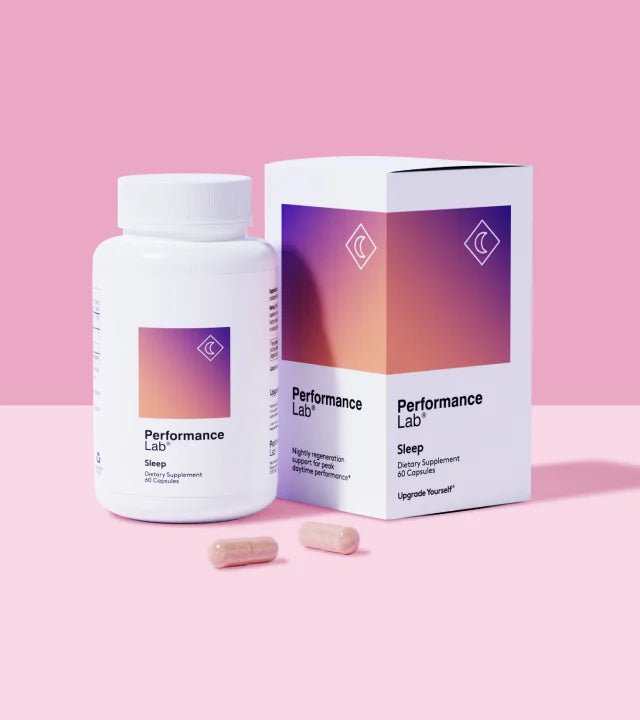
Prebiotics and Probiotics
Prebiotics and probiotics may help with ADHD by improving gut health, which is increasingly linked to brain function and behavior. The gut-brain axis, a communication network between the gut and the brain, plays a crucial role in regulating mood, cognition, and overall mental health.
Probiotics introduce beneficial bacteria into the gut, while prebiotics feed these bacteria, helping to maintain a balanced gut microbiome. Research suggests that a healthy gut microbiome can positively influence neurotransmitter production and regulate inflammation.(25)
These benefits may hold the potential to contribute to better focus, attention, and mood in individuals with ADHD.
I’ve improved my gut health exponentially. Can’t recommend them enough.Josh S
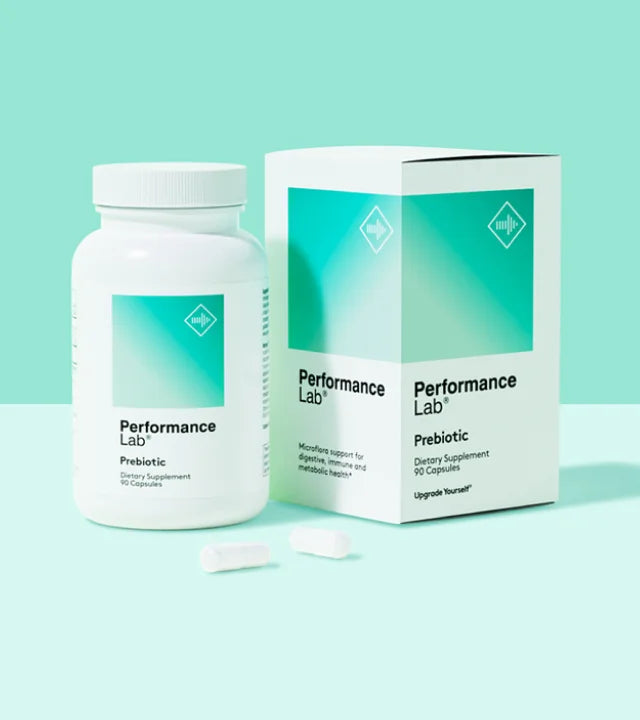
Best Nootropics for ADHD in 2025 - Top Supplements
There are many dietary supplement products on the market that claim to help with attention. But people with attention issues must be discerning in which products they buy.
A good supplement for ADHD must deliver nootropics and other nutrients that are backed by research. Even better if the supplement itself is research backed. Further, did you know that some researchers have linked artificial additives to ADHD symptoms?(28) An ideal supplement for attention must be clean as well.
Following are some top picks that deliver nootropics, vitamins, minerals, herbs and more for ADHD in clean, premium-quality formats:
Mind Lab Pro® - Best All-In-One Nootropics Stack for ADHD

Mind Lab Pro Ingredients:
- Citicoline, 250 mg
- Phosphatidylserine (PS), 100 mg
- Bacopa monnieri, 150 mg (full-spectrum extract, 24% bacosides with 9 bioactives)
- Organic Lion's Mane Mushroom, 500 mg (fruit and mycelium)
- Maritime Pine Bark Extract, 75 mg: (Standardized to 95% proanthocyanidins)
- N-Acetyl L-Tyrosine, 175 mg
- L-Theanine, 100 mg
- Rhodiola rosea, 50 mg (Standardized extract: 3% rosavins and 1% salidrosides)
- NutriGenesis® B-Vitamins: Vitamin B6 (2.5 mg), Vitamin B9 (100 mcg), Vitamin B12 (7.5 mcg)
Mind Lab Pro® is a comprehensive nootropic supplement designed to improve cognitive performance and overall brain health. It utilizes an advanced blend of scientifically researched natural nootropics, providing users with improved mental clarity, productivity, and long-term brain support.
MLP® is backed by research. Specifically, two double-blind, placebo-controlled human research trials conducted at the University of Leeds have demonstrated its benefits for information processing and several aspects of memory.(1,2).
Ultimately, Mind Lab Pro® is the one cognitive enhancer that does everything you need -- focus, memory, attention, concentration, mood, relaxation, stress resistance, memory and more. As a result of its whole-brain optimization, MLP may uniquely promote sharper brainpower in those with ADHD.
Want clearer days and steadier focus, without stimulant jitters?
Performance Lab® Omega-3 - Clean Vegan Algae Oil Softgels

Ingredients: Each serving of vegan-friendly, carrageenan-free NutriGels® supplies 1800 mg algal oil (540 mg DHA [Docosahexaenoic Acid]) and 270 mg EPA (Eicosapentaenoic Acid).
Omega-3s are among the top research-backed nutrients for helping with ADHD issues. They are also most versatile nutrients for human health, assisting with brain function, joint comfort, bone density, eye wellness, immune performance and more. The problem? Omega-3s are often sourced from fish.
Performance Lab® Omega-3 instead supplies Omega-3s from algae -- not fish -- so you get all those great benefits without "fish burps," gastric distress or concerns about toxic contaminants. It's the perfect foundation supplement for anyone struggling with attention issues.
Performance Lab® Caffeine 2

This "smart caffeine" delivers precision stimulation in a cleaner, healthier format.
Ingredients: Natural Caffeine (from Coffea robusta seeds), L-Theanine, L-Tyrosine, NutriGenesis® Caffeine Balance B-Complex.
In people with ADHD who can tolerate stimulation, caffeine may be helpful when used correctly. For best results, it is advisable to stay in the low-to-moderate caffeine dosage range. Even better is knowing your sweet spot. Caffeine 2 helps you do just that.
Caffeine 2 is 50 mg of caffeine in each capsule plus balancers. Start with one capsule, see how you perform. Move up to two capsules the next day. And three, if needed, the next. The idea is that this precision caffeine pill helps you zero in on the best dosage for attention, energy & focus benefits without experiencing the side effects that worsen performance.
In addition, Caffeine 2 includes balancers like L-theanine, L-Tyrosine and NutriGenesis B-Vitamins to enhance all caffeine advantages and benefits while reducing jitters and crashes.
The end result is performance-tuned stimulation: Smoother, cleaner, healthier, sharper energy that's easy and convenient to take every day for ADHD -- without the risks and side effects of mega-dose caffeine.
Performance Lab® Sleep - Melatonin from Tart Cherry

Ingredients: Magnesium (as Magnesium Bisglycinate, Taurate and NutriGenesis®) 100 mg; CherryPURE® (Whole Montmorency Tart Cherry) (Prunus cerasus) (fruit) (50:1 concentrated ratio) 500 mg; L-Tryptophan 200 mg; Lemon Balm Extract 200 mg.
Studies suggest that better sleep may lead to reductions in core ADHD symptoms, as adequate rest is crucial for optimal brain function.
This natural sleep formula supplies natural low-dose melatonin (from cherries) to gently induce sleep. But that's just one pathway to the best sleep of your life.
Performance Lab Sleep also supplies antioxidants to soothe body aches, two forms of magnesium to relax muscles, and natural support for calming and relaxing brain chemicals.
It's the ultimate sleep formula for anyone seeking to conquer sleep disturbances and their negative impact on attention, focus, energy and everything else!
Performance Lab® NutriGenesis Multi - Men's & Women's Formulas

Ingredients: 24 cultured essential vitamins and minerals complexed with cofactors for optimal potency.
NutriGenesis® multivitamins deliver the essentials for brain health, including those with promise for ADHD like iron, B6, magnesium and more.
NutriGenesis® cultured nutrients include cofactors, enzymes and probiotics that enhance their bioavailability, metabolism and utilization.
Performance Lab® NutriGenesis® Multi is an ultramodern multivitamin customized for men's and women's distinct nutritional needs, featuring these high-absorption nutrients. It's foundational support for brain health, including neurotransmitters that are closely related to attentional performance.
The only multi I’ve used and noticed more energy and better overall wellbeing!Jerrold N
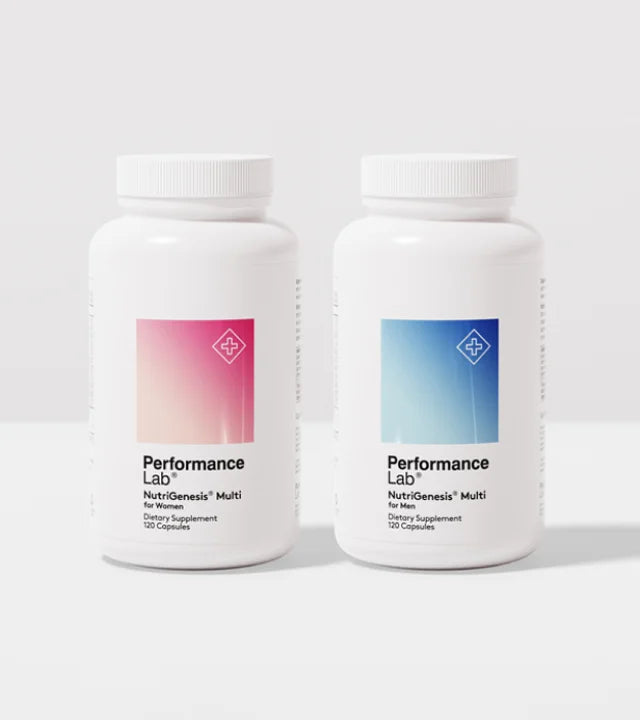
Performance Lab® Prebiotic - Nourishes Gut-Brain Connection

Ingredients: Each serving of 3 NutriCaps supplies two grams of Inulin-FOS (FructoOligoSaccharides) from chicory root).
Prebiotic fiber feeds gut probiotics (good bacteria) to build a thriving microbiome associated with multiple health benefits.
In addition to their many other benefits, prebiotics & probiotics may have cognitive benefits for those with ADHD.(26)
Performance Lab® Prebiotic is a performance fiber supplement in convenient capsules. It supports many aspects of wellness, including good digestion, cardiovascular health, immune performance and weight management, as well as “feeding” the microbiome to help support brain chemicals associated with mood.
It's the cleanest, most convenient prebiotic supplement on the market today. Perfect for any clean diet and lifestyle for ADHD support.
FINAL THOUGHTS
Attention problems can hold you back in your life. Prescription medications, including stimulants that boost dopamine, are often a first-line therapy for ADHD. But for some people, the side effects of these therapies can be challenging.
There are many natural approaches to sharpening attention, such as maintaining a healthy diet and adequate sleep. And increasingly, nootropics -- as well with other categories of dietary supplements -- are considered as a supportive therapy that can help to naturally nourish the brain and optimize its function.
For those seeking alternative therapies for managing ADHD symptoms, lifestyle changes and nootropics may be a smart choice. But it's especially important for people with attention problems to buy a clean, high-quality formula.
Mind Lab Pro is it. It includes several nootropics that have been studied for their potential to assist with ADHD. In combination, these brain-boosters may deliver noticeable improvements in attention. But ADHD can impact so much more, including issues with stress, mood problems, spotty memory and other cognitive functions.
Mind Lab Pro is also a premium-quality supplement, expertly formulated and clinically studied, with millions of bottles sold. Clean, safe, and free of side effects. Just what people with attention concerns need. And with the other clean formulas discussed in this article, it works even better.

References
- Utley A, Gonzalez Y, Imboden CA. The Efficacy of A Nootropic Supplement on Information Processing in Adults: A Double Blind, Placebo Controlled Study. Biomed J Sci & Tech Res 49(1)-2023. BJSTR. MS.ID.007746
- Abbott-Imboden C., Gonzalez Y., Utley A. (2023). Efficacy of the nootropic supplement Mind Lab Pro on memory in adults: Double blind, placebo-controlled study. Human Psychopharmacology: Clinical and Experimental, e2872. https://doi.org/10.1002/hup.2872
- https://www.cdc.gov/ncbddd/adhd/diagnosis.html
- Prince J. Catecholamine dysfunction in attention-deficit/hyperactivity disorder: an update. J Clin Psychopharmacol. 2008 Jun;28(3 Suppl 2):S39-45.
- Chang, JC., Su, KP., Mondelli, V. et al. Omega-3 Polyunsaturated Fatty Acids in Youths with Attention Deficit Hyperactivity Disorder: a Systematic Review and Meta-Analysis of Clinical Trials and Biological Studies. Neuropsychopharmacol. 43, 534–545 (2018).
- Hirayama S, et al. The effect of phosphatidylserine administration on memory and symptoms of attention-deficit hyperactivity disorder: a randomised, double-blind, placebo-controlled clinical trial. J Hum Nutr Diet. 2013 Mar 17.
- Glade MJ, Smith K. Phosphatidylserine and the human brain. Nutrition. 2015 Jun;31(6):781-786.
- Anas Sohail A, Ortiz F, Varghese T, Fabara SP, Batth AS, Sandesara DP, Sabir A, Khurana M, Datta S, Patel UK. The Cognitive-Enhancing Outcomes of Caffeine and L-theanine: A Systematic Review. Cureus. 2021 Dec 30;13(12):e20828. doi: 10.7759/cureus.20828. PMID: 35111479; PMCID: PMC8794723.
- Robertson NU, Schoonees A, Brand A, Visser J. Pine bark (Pinus spp.) extract for treating chronic disorders. Cochrane Database Syst Rev. 2020 Sep 29;9(9):CD008294. doi: 10.1002/14651858.CD008294.pub5. PMID: 32990945; PMCID: PMC8094515.
- Neri, DF, Wiegmann D, Stanny RR, Shappell, SA, McCardie A, McKay, DL. The effects of tyrosine on cognitive performance during extended wakefulness. Aviat Space Environ Med. 1995 Apr;66(4):313-9
- E. McGlade, A. Locatelli, J. Hardy, T. Kamiya, M. Morita, K. Morishita, Y. Sugimura and D. Yurgelun-Todd, "Improved Attentional Performance Following Citicoline Administration in Healthy Adult Women," Food and Nutrition Sciences, Vol. 3 No. 6, 2012, pp. 769-773.
- Nobre AC, et al. L-theanine, a natural constituent in tea, and its effect on mental state. Asia Pacific Journal of Clinical Nutrition, 01/2008; 17 Suppl 1:167-8.
- Lyon MR, et al. The effects of L-theanine (Suntheanine®) on objective sleep quality in boys with attention deficit hyperactivity disorder (ADHD): a randomized, double-blind, placebo-controlled clinical trial. Altern Med Rev. 2011 Dec;16(4):348-54.
- Gomez-Ramirez M, et al. The deployment of intersensory selective attention: a high-density electrical mapping study of the effects of theanine. Clinical Trial Clin Neuropharmacol. Jan-Feb 2007;30(1):25-38.
- Morgan A, Stevens J. Does Bacopa monnieri improve memory performance in older persons? Results of a randomized, placebo-controlled, double-blind trial. Randomized Controlled Trial J Altern Complement Med. 2010 Jul;16(7):753-9.
- Dave UP, et al. An open-label study to elucidate the effects of standardized Bacopa monnieri extract in the management of symptoms of attention-deficit hyperactivity disorder in children. Clinical Trial Adv Mind Body Med. Spring 2014;28(2):10-5.
- Ivanova Stojcheva E, Quintela JC. The Effectiveness of Rhodiola rosea L. Preparations in Alleviating Various Aspects of Life-Stress Symptoms and Stress-Induced Conditions-Encouraging Clinical Evidence. Molecules. 2022 Jun 17;27(12):3902. doi: 10.3390/molecules27123902. PMID: 35745023; PMCID: PMC9228580.
- Villagomez A, Ramtekkar U. Iron, Magnesium, Vitamin D, and Zinc Deficiencies in Children Presenting with Symptoms of Attention-Deficit/Hyperactivity Disorder. Children (Basel). 2014 Sep 29;1(3):261-79. doi: 10.3390/children1030261. PMID: 27417479; PMCID: PMC4928738.
- Landaas ET. Vitamin levels in adults with ADHD. BJPsych Open. 2016 Nov; 2(6): 377–384.
- Hemamy M, et al. The effect of vitamin D and magnesium supplementation on the mental health status of attention-deficit hyperactive children: a randomized controlled trial. BMC Pediatrics volume 21, Article number: 178 (2021)
- Mousain-Bosc M. Improvement of neurobehavioral disorders in children supplemented with magnesium-vitamin B6. I. Attention deficit hyperactivity disorders. Magnes Res. 2006 Mar;19(1):46-52.
- Arnold LE, Disilvestro RA, Bozzolo D, et al. Zinc for attention-deficit/hyperactivity disorder: placebo-controlled double-blind pilot trial alone and combined with amphetamine. J Child Adolesc Psychopharmacol. 2011;21(1):1-19.
- Konofal E, Lecendreux M, Deron J, Marchand M, Cortese S, Zaïm M, Mouren MC, Arnulf I. Effects of iron supplementation on attention deficit hyperactivity disorder in children. Pediatr Neurol. 2008 Jan;38(1):20-6. doi: 10.1016/j.pediatrneurol.2007.08.014. PMID: 18054688.
- Hvolby A. Associations of sleep disturbance with ADHD: implications for treatment. Atten Defic Hyperact Disord. 2015 Mar;7(1):1-18. doi: 10.1007/s12402-014-0151-0. Epub 2014 Aug 17. PMID: 25127644; PMCID: PMC4340974.
- Martin SE, Kraft CS, Ziegler TR, Millson EC, Rishishwar L, Martin GS. The Role of Diet on the Gut Microbiome, Mood and Happiness. medRxiv [Preprint]. 2023 Mar 21:2023.03.18.23287442. doi: 10.1101/2023.03.18.23287442. PMID: 36993403; PMCID: PMC10055576.
- Allahyari P, et al. A systematic review of the beneficial effects of prebiotics, probiotics, and synbiotics on ADHD. Neuropsychopharmacol Rep. 2024 Jun;44(2):300-307. doi: 10.1002/npr2.12437. Epub 2024 Apr 16. PMID: 38623929; PMCID: PMC11144606.
- Report Links Synthetic Food Dyes to Hyperactivity and other Neurobehavioral Effects in Children - OEHHA (ca.gov)
These statements have not been approved by the Food and Drug Administration. This product is not intended to diagnose, treat, cure or prevent any disease. This article is an opinion and explanation of current research given by the author. It is not an expression of a medical diagnosis or treatment and should not be relied on as such.

